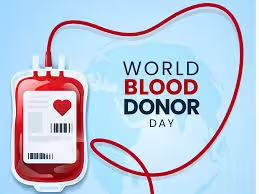World Blood Donor Day, observed annually on June 14th, celebrates the critical role of voluntary blood donors in saving lives and improving health globally. Established by the World Health Organization (WHO) in 2004, the day aims to raise awareness about the importance of safe blood donation and to thank donors for their life-saving gifts.
Importance of World Blood Donor Day:
- Raising Awareness: The day serves as a platform to educate communities about the constant need for safe blood and blood products. It emphasizes the importance of regular voluntary blood donation to ensure reliable and sustainable blood supply.
- Recognizing Donors: World Blood Donor Day acknowledges and appreciates voluntary unpaid blood donors for their altruistic contributions. Their donations help patients suffering from various medical conditions, including trauma, surgeries, cancer, and chronic illnesses.
- Promoting Safe Blood Practices: The day highlights the significance of safe blood transfusion practices. It encourages health authorities and blood services to maintain high standards in donor selection, blood collection, testing, processing, storage, and distribution.
- Supporting Health Systems: Adequate blood supply is essential for effective health care delivery, emergencies, and disaster response. World Blood Donor Day encourages governments and health organizations to strengthen national blood transfusion services and infrastructure.
- Global Impact: The observance is celebrated worldwide, involving governments, health professionals, blood donors, civil society organizations, and the media. It fosters international collaboration in promoting blood donation as a fundamental component of public health systems.
Activities on World Blood Donor Day:
- Blood Drives: Many countries organize blood donation drives and campaigns to encourage people to donate blood voluntarily. These events often feature educational sessions, testimonials from donors, and promotional activities to attract new donors.
- Community Engagement: Health organizations and blood services engage with communities through outreach programs, workshops, and media campaigns. They aim to dispel myths about blood donation and inform the public about its benefits.
- Recognition Events: Donors and blood donation champions are recognized for their contributions to motivate others to donate. Special ceremonies and awards ceremonies may be held to honor their commitment and generosity.
- Policy Advocacy: Discussions and seminars may take place to advocate for policies that support voluntary blood donation, ensure blood safety, and improve access to blood transfusion services, especially in underserved areas.
Impact and Future Goals:
- Improved Health Outcomes: World Blood Donor Day contributes to reducing mortality and morbidity rates worldwide by ensuring timely access to safe blood.
- Increased Voluntary Donations: Efforts to raise awareness have led to an increase in voluntary blood donations, enhancing the availability of blood for those in need.
- Sustainable Blood Supply: The day promotes sustainable blood supply systems that are resilient to emergencies and capable of meeting the demands of growing populations.
Blood donation offers numerous benefits, both for the recipients who receive the blood and for the donors themselves. Here are the key benefits of blood donation:
Benefits for Recipients:
- Life-Saving: Blood donations are critical for saving lives in emergencies such as accidents, surgeries, childbirth complications, and medical treatments for conditions like cancer and blood disorders.
- Improves Health: For patients with chronic illnesses or medical conditions requiring regular transfusions (e.g., thalassemia, sickle cell disease), blood donations provide essential support to maintain health and quality of life.
- Surgical Procedures: Many surgeries, including complex procedures, rely on blood transfusions to replace blood lost during surgery and ensure patients recover safely.
- Emergency Care: During disasters or mass casualty incidents, a ready supply of blood ensures that medical facilities can quickly respond to the needs of injured individuals, saving lives in critical situations.
Benefits for Donors:
- Health Check: Before donating blood, donors undergo a health screening that includes tests for blood pressure, hemoglobin levels, and infectious diseases. This serves as a mini-physical check-up, providing insights into the donor’s health status.
- Reduced Risk of Health Issues: Regular blood donation may reduce the risk of cardiovascular diseases such as heart attacks and strokes. It helps maintain healthy iron levels by reducing iron stores in the body, which can benefit donors at risk of iron overload.
- Sense of Fulfillment: Donating blood is a voluntary act of kindness that provides donors with a sense of satisfaction and fulfillment. Knowing that their donation can save lives or improve someone’s health motivates many donors to continue giving regularly.
- Community Engagement: Blood donation fosters community spirit and solidarity. It brings together people from diverse backgrounds to contribute to a common cause—ensuring the availability of safe blood for those in need.
- Donor Recognition: Many blood donation organizations recognize donors for their contributions through certificates, awards, or donor recognition programs. This acknowledgment reinforces the importance of blood donation and encourages others to participate.
Societal Benefits:
- Supports Public Health: A steady supply of blood ensures that healthcare providers can meet the transfusion needs of patients across various medical conditions, thereby supporting public health initiatives.
- Economic Impact: By reducing the burden of disease and improving health outcomes, blood donation contributes to economic productivity by keeping individuals healthy and reducing healthcare costs associated with severe illnesses.
- Emergency Preparedness: Blood banks and transfusion services play a crucial role in emergency preparedness and response. Adequate blood supplies enable rapid response to disasters and emergencies, saving lives during critical times.
In summary, blood donation benefits both recipients and donors alike, promoting health, community engagement, and societal well-being. Encouraging regular voluntary blood donation helps maintain a stable blood supply and ensures that lifesaving treatments are available when needed.



